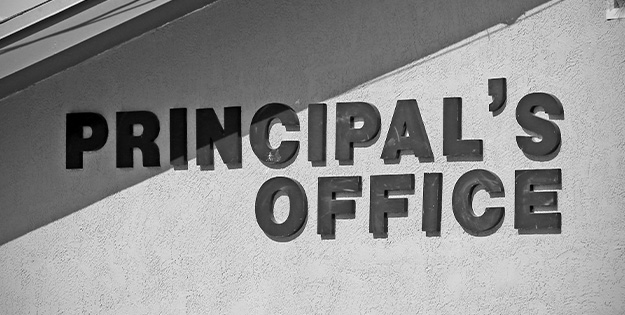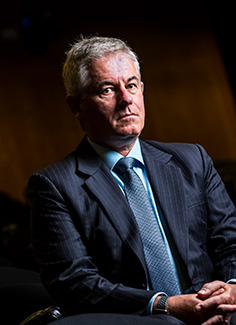Career
Copyright@ Australian Catholic University 1998-2024 | ABN 15 050 192 660 CRICOS Reg: 00004G
Copyright@ Australian Catholic University 1998-2024 | ABN 15 050 192 660 CRICOS Reg: 00004G

Principals face threats, bullying and violence while on the job educating Australia’s children. And in many cases, parents are to blame. Impact caught up with Professor Philip Riley, the ACU researcher who conducts the annual principal health survey.
When you think of professions that are likely to experience violence and threats on the job, there are a few that spring to mind: police officers, parking rangers, paramedics, social workers and the like.
Well, there’s another occupation you might add to that list.
One in three Australian school principals was a victim of physical violence in 2018, according to a long-term study that has surveyed more than half of the nation’s 10,000 principals in the past eight years.
The Australian Principal Occupational Health, Safety and Wellbeing Survey found that the rise in violent attacks, as well as excessive workloads, long hours and unprecedented levels of stress, is driving our school leaders to sleeplessness, burnout and depression.
It found that principals were almost 10 times more likely to be physically attacked than the general population, a figure that the study’s chief investigator, Professor Philip Riley, labels “a national disgrace”.
“The fact that one-third of principals experience physical violence at work paints a sad picture of Australian society,” says Professor Riley, a researcher with ACU’s Institute of Positive Psychology and Education.
Violence against school leaders has been on a steady upward trend since his first survey of principals in 2011, and female principals appear to be most at risk of being attacked, with 40 per cent subjected to violence in 2018.
But sticks and stones aren’t the only problem.
Almost half of all principals were subjected to verbal threats of violence in 2018, up from 38 per cent in 2011, while bullying is also on the increase.
“This is much bigger than schools, because nurses, police officers and social workers are all reporting the same sorts of increases in offensive behaviour, and I think that's pretty terrible,” Professor Riley says.
“The thing with those other front-line workers is that they probably know they’re signing up for it when they take on the job, but it’s definitely not the type of thing you sign up for as a school teacher or principal.”
So who’s to blame for the rise in aggression towards principals?
For the most part, the finger can be pointed squarely at abusive and vexatious parents, says Professor Riley, adding that while the survey doesn’t examine the reasons for the increase, anecdotal evidence suggests it’s partly due to a widespread lack of trust in institutions.
“In recent years that trust has been eroded, and in some cases with good reason, but the result is that people tend to behave in a way that’s very demanding and this can often lead to aggression,” he says.
In mid-2018, the principal of an independent Sydney school urged parents to “chill” in the school newsletter, taking aim at those who believe they are “entitled to make extravagant demands”.
“I am having to interact with too many parents who have verbally abused, physically threatened or shouted at a staff member,” wrote John Collier, head of St Andrew’s Cathedral School. He detailed one incident were a student’s parents were “bullying staff on a daily basis”.
Professor Riley, who worked as a principal in Victoria in the early 2000s, says he’s heard of similar examples all over Australia.

“Obviously there are high levels of emotion because your kids are the most important thing in your life,” he says. “The attitude is, ‘I want what’s best for my child and you must do it my way’, and that seems to be leading to all kinds of inappropriate behaviour.”
There is also anecdotal evidence that disgruntled parents are using social media to “whip up a frenzy” and intimidate teachers and principals.
Meanwhile, the behaviour of some parents towards principals often rubs off on their children, Professor Riley adds.
“Clearly if the parents are behaving like that, before long the students think, ‘well, that's just what you do’, and then it starts to play out in school with kids harassing teachers and principals.”
It’s not just the threat of violence that’s taking its toll on principals.
The 2365 school leaders surveyed for the latest study cited the sheer quantity of work and the lack of time to focus on teaching as their greatest sources of stress.
Principals are busier than they used to be, thanks largely to the low-level administrative tasks that come with an increase in red tape in school systems.
“We now have this ridiculous situation where the highest paid person in the school is doing low-level admin work instead of the job they’ve been employed to do,” Professor Riley says.
The result is that principals are spending way too much time at work, with 99.7 per cent working far beyond the maximum hours recommended for positive mental and physical health.
The study found that 53 per cent of principals worked more than 56 hours a week, and a quarter worked a whopping 61-65 hours. And despite the view that principals have excessive holidays, the survey found that 40 per cent work more than 25 hours a week in-between school terms.
A small minority of principals “wear 80 hours a week as a badge of honour”, Professor Riley says. “There’s a bit of a culture of, ‘yeah, I’m tough, just give me whatever and I'll cope with it’, but I think that's beginning to shift with the increased awareness of the effects that can have on your life.”
Some of those effects include high rates of burnout, stress, depression, physical symptoms and, perhaps worst of all, sleeplessness, which puts principals at a higher risk of a range of chronic diseases.
“They wake up at 2am in this sort of terror state because of something that happened at school, or something they know is going to happen tomorrow,” Professor Riley says.
“It's amazing how many people I've spoken to who either retired or changed jobs and almost immediately started sleeping through the night. That’s a pretty good indicator that something was not right.”
The increased pressure on principals appears to be squashing the desire of senior teachers to take on the top job, Professor Riley says. He foresees “a looming crisis” related to a shortage of principals across Australia in coming years.
“There’s been something like an 70 per cent decline in real application rates for the principal-ship at a time when 70 per cent of principals are within two or three years of retiring,” he says.
“So it’s clearly a crisis and I’m worried that there will be a blanket government response, like they did in Portugal, where principals are now in charge of five schools. So they solved the principal shortage with the stroke of a pen but they did nothing to address the issues that led to the shortage.”
Professor Riley recommends that Australia adopt a “whole of government approach to education”, where state and federal governments combine resources to oversee a single education budget.
“There are no quick fixes with this, and we first have to start to treat it seriously and admit we have a real problem with the way our principals are treated,” he says.
The paradox is that despite the violence and high levels of stress, burnout and depression, principals report a greater level of job satisfaction than the general population.
“They feel like they're doing very important work and clearly they are — they have the ability to change people's lives,” Professor Riley says.
“If you ask any teacher or principal what they like about their job, they’ll give you names of kids who were difficult and describe how they turned them around. It's not about the money, it's not about the holidays, it’s not about prestige … it's really about doing something to help people. That’s what keeps them going.”
Professor Philip Riley spent 16 years in schools before moving to the tertiary sector. Every year since 2011, he has led a team of researchers at ACU’s Institute of Positive Psychology and Education to conduct The Australian Principal Occupational Health, Safety and Wellbeing Survey.

Copyright@ Australian Catholic University 1998-2024 | ABN 15 050 192 660 CRICOS Reg: 00004G